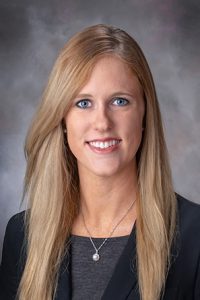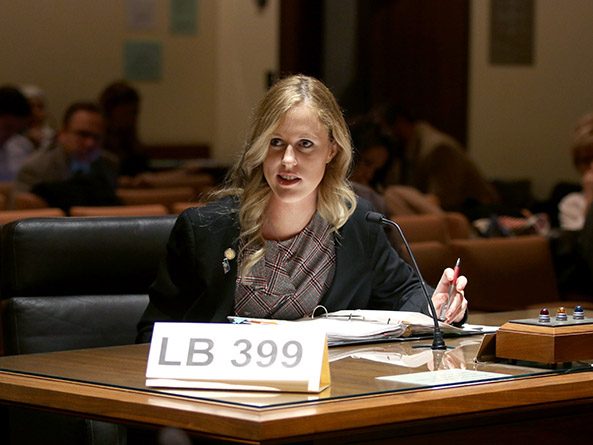Civics exam for middle and high schoolers proposed
The Education Committee heard testimony Jan. 29 on a bill intended to ensure civic competence among Nebraska students.
Under current law, school boards are required to appoint three members to a committee on Americanism, which approves textbooks used in the teaching of American history and government.
LB399, introduced by Peru Sen. Julie Slama, would change the name of the committee to the committee on American civics. The new committee would be required to hold at least two public meetings annually and ensure that the district’s social studies curriculum is accessible to the public.
It also would ensure that the district’s curriculum aligns with state social studies standards and “teaches and assesses foundational knowledge in civics, history, economics, financial literacy and geography.”
Additionally, the committee would ensure that the district administers the 100-question civics portion of the U.S. Citizenship and Immigration Services naturalization exam to students no later than eighth grade and again no later than 11th grade. A student’s individual score would be given to the student’s parents or guardians.
LB399 also would add to the list of days on which schools are required to conduct patriotic exercises, such as Dr. Martin Luther King, Jr.’s birthday and Native American Day.
The bill would eliminate the current criminal penalty for violating the Americanism statute’s provisions.
Slama said some school districts either do not adhere to the 1949 Americanism statute or do not emphasize teaching American history, government and civics. Although she graduated from high school not long ago, Slama said, she does not remember much of what she learned in math, science and English. Civic education is different, she said.
“I have used that knowledge every day since high school in everything from reading the newspaper to voting in elections,” Slama said. “While not all students will strive to be an elected official, we should be giving them the basic knowledge and opportunity to be informed citizens.”
John Ross of Bancroft testified in support of the bill, saying it would provide schools with guidelines for teaching and assessing basic civic knowledge. Ross said he is concerned that students are not learning enough about the U.S. Constitution, the Bill of Rights and what the Founding Fathers did to win independence.
“Our forefathers gave us the foundation,” he said. “We all know what happens when a foundation of a building fails—it collapses.”
John Worthing, an Elm Creek Public Schools board member, also testified in support. He said the state requires testing and tracking of student scores in science, math and reading but not social studies, which he said is treated as the “proverbial stepchild.”
Worthing said the civics portion of the naturalization exam, while limited, is a good starting point for assessing basic knowledge of American government and history. Providing students’ scores to their parents would create some accountability, he added.
Testifying in opposition to the bill was Brian Halstead of the state Department of Education. He read a letter from Commissioner of Education Matthew Blomstedt in which Blomstedt wrote that the state Board of Education objects only to the bill’s requirement that districts administer the civics exam.
“The naturalization examination is not an appropriate measure of civic readiness and should not be included in LB399,” Blomstedt wrote. “The requirement of the additional assessment usurps the powers traditionally reserved to establish local curriculum and classroom instruction materials and methods for student learning and engagement.”
Angelie Salahou-Philips of Omaha also testified in opposition. Although teaching civic engagement is crucial, she said, LB399 is intended to indoctrinate students with a “sugar-coated, whitewashed” version of American history.
“Systematically and routinely instilling into our youth that the U.S. is superior in government structure and systems is not civics, nor is it patriotism,” Salahou-Philips said. “It’s nationalism and ethnocentrism, and it doesn’t belong in our schools.”
The committee took no immediate action on the bill.


